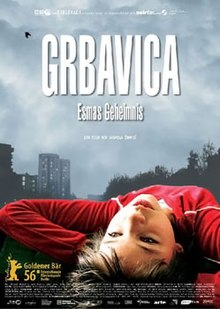Grbavica (film)
| Grbavica | |
|---|---|
 Grbavica film poster | |
| Directed by | Jasmila Žbanić |
| Written by | Jasmila Žbanić, Barbara Albert |
| Produced by | Tanja Aćimović |
| Starring | Mirjana Karanović, Luna Mijović |
| Music by | Enes Zlatar |
| Distributed by | Dogwoof Pictures |
Release dates | |
Running time | 90 min. |
| Language | Bosnian |
Grbavica is a film by Jasmila Žbanić about the life of a single mother in contemporary Sarajevo in the aftermath of systematic rapes of Bosniak women by Serbian troops during the war. It was released in the United Kingdom as Esma's Secret: Grbavica, and in USA as Grbavica: Land of My Dreams.
The film shows, through the eyes of the main character Esma, her teenage daughter Sara, and others, how everyday life is still being shaped by the Yugoslav wars of the 1990s. The title refers to a neighbourhood of Sarajevo Esma lives in. The film was an international co-production between companies from Bosnia, Austria, Croatia and Germany; it received funding from the German television companies ZDF and Arte. Grbavica received an enthusiastic response from critics, earning a 98% rating on Rotten Tomatoes, a website that aggregates professional critiques.
It won the Golden Bear at the 2006 Berlin Film Festival and it was Bosnia & Herzegovina's official entry for the Best Foreign Language Film at the 79th Academy Awards.
Background
According to the director,
- "...in 1992 everything changed and I realised that I was living in a war in which sex was used as part of a war strategy to humiliate women and thereby cause the destruction of an ethnic group! 20,000 women were systematically raped in Bosnia during the war." [1]
In the film, the perpetrators are called Chetniks, a derogatory term which some of the population of Sarajevo used for the besieging Serb troops. The director claims that she avoided the word Serb on purpose, in order to avoid imposing collective guilt on an entire ethnic group.[citation needed]
Synopsis
Single mother Esma lives with her 12-year-old daughter, Sara, in post-war Sarajevo. Sara wants to go on a school trip and Esma starts working as a waitress in a nightclub in order to earn the money. Sara makes friends with Samir, who, like Sara, has no father. Both of their fathers allegedly died as war heroes. Samir is surprised that Sara doesn’t know the circumstances of her father’s death. Samir’s own father was massacred by Chetniks near Žuč when he refused to leave the trench he was defending. And yet, whenever mother and daughter discuss this delicate topic, Esma’s responses are always vague. The situation becomes more complicated when the school offers to take pupils on the trip free of charge, provided they can furnish a certificate proving that they are the offspring of a war hero. Esma explains to Sara that her father’s corpse was never found and that she does not possess such a certificate. She promises to try to obtain the document. In reality she attempts to borrow the money Sara needs – from her friend, Sabina, from her aunt and from her boss. Sara can’t get rid of the nagging feeling that something’s not right. Shocked and bewildered when she discovers she is not mentioned as the child of a war hero on the list of pupils on the school trip, she lashes out at a classmate, explaining that her father was massacred on the front near Žuč when he refused to desert his trench. At home, however, she confronts her mother, demanding to know the truth. Esma breaks down and brutally reveals the painful facts: Esma was raped in a prisoner-of-war camp and forced to have the child that resulted from this violation. All at once, Sara realises that she is the child of a Chetnik. And yet, the knowledge also brings them a step closer to overcoming the trauma. In the end Sara leaves for a school trip, waving to Esma at the last moment. In the bus children are singing a popular song about Sarajevo ("Land of My Dreams"), and in the end Sara joins as well, and thus ends the film on a bright and optimistic note.
Cast
- Mirjana Karanović as Esma
- Luna Mijović as Sara
- Leon Lučev as Pelda
- Kenan Čatić as Samir
- Jasna Ornela Berry as Sabina
- Dejan Ačimović as Čenga
- Bogdan Diklić as Šaran
- Emir Hadžihafizbegović as Puška
- Ermin Bravo as Profesor Muha
- Semka Sokolović-Bertok as Pelda's Mother
- Maike Höhne as Jabolka
- Jasna Žalica as Plema
- Nada Džurevska as Aunt Safija
- Emina (Minka) Muftić as Vasvija
- Dunja Pašić as Mila
Distribution
In the UK, the film opened in selected cinemas in London and Sheffield on December 15, 2006.
While it has been screened in Sarajevo, it is unlikely that the film will be shown in cinemas in the Republika Srpska entity of Bosnia and Herzegovina, as the major film distributor "doubts its commercial viability".[citation needed] It has, however, been shown in Serbia itself.
Awards
Wins
- Golden Bear - Best Film - Berlin Film Festival 2006
- Peace Film Award - Berlin Film Festival 2006
- Prize of the Ecumenical Jury - Berlin Film Festival 2006
- KOSMORAMA award - Best Film
- Reykjavik Film Festival - Best Film
- AFI Film Festival - Narrative grand jury prize
- Brussels European Film Festival - Prize TV Canvas for Best Film and Award Best Actress (to Mirjana Karanović)
- Ourence Film Festival - Award Best Actress (to Mirjana Karanović)
- Portland International Film Festival - Audience Award
- Thessaloniki Film Festival - Woman & Equality Award
Nominations
- Hollywood World Awards - Best Film
- Sundance Film Festival - Grand Jury Prize
- European Film Awards - Best Film and Best Actress (awards in December)
